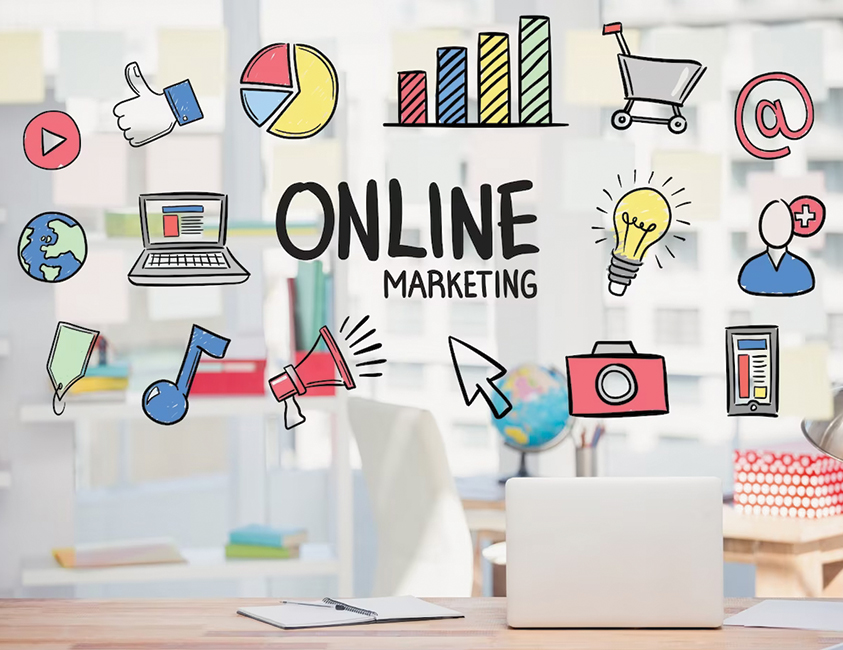
In today’s digital age, the realm of marketing has significantly transformed, propelling businesses towards the vast opportunities presented by online platforms. Internet marketing, synonymous with online marketing, embodies a spectrum of digital techniques aimed at elevating brand presence and engagement within target markets. Unlike traditional approaches, it operates within the dynamic ecosystem of the internet, leveraging its vast outreach and interaction potential.
Internet marketing serves as a multifaceted conduit for businesses, enabling them to advertise, communicate, and facilitate sales. Its overarching goal is to propel traffic to a company’s website through a diverse array of methods, harnessing the power of various digital channels and strategies.
The internet has become an indispensable facet of modern existence, with businesses and consumers heavily reliant on its expansive reach. Consequently, structured and strategic internet marketing plays an indispensable role in amplifying business success. Establishing a robust online presence is not merely advantageous but has evolved into a necessity in today’s competitive landscape.
The quest to allure new clientele necessitates a judicious blend of approaches. Paid social media campaigns, while impactful, demand meticulous market research and A/B testing for optimal results. Simultaneously, maintaining a robust SEO presence stands pivotal in drawing in fresh customers. Emphasizing paid social media marketing, search engine optimization, and astute web design proves instrumental in this pursuit.
In the contemporary digital milieu, consumer perceptions of brands have shifted notably towards online platforms. Word-of-mouth, a stalwart in shaping brand images, has transcended physical boundaries and thrives across various social media channels. The opinions of peers and online reviews wield substantial influence, superseding the efficacy of traditional marketing and advertising.
Content marketing diverges from conventional advertising paradigms by prioritizing audience value and thought leadership. While traditional advertising accentuates brand-centric promotion, both media seek to augment conversions through distinct approaches. Content marketing’s deliberate, SEO-centric strategy aims at converting visitors into enduring consumers, while traditional marketing targets rapid audience acquisition.
Businesses must evaluate their goals and objectives to discern the suitability of internet marketing. Its indispensable role in enhancing brand awareness, broadening reach, and augmenting sales renders it a pivotal component of contemporary business strategies.
As consumers increasingly gravitate towards online avenues for information, research, and purchases, a robust online marketing strategy becomes imperative for sustained competitiveness and customer acquisition in the digital era.
While internet marketing does share some similarities with traditional, offline marketing, there are some key differences. The most apparent is the immediacy and pace of the internet. Advertisements can be published online in a matter of hours, and the internet landscape changes rapidly – just think about the explosion of social media in the last decade. Internet marketing requires a different skillset and strategy to effectively reach and engage your target audience in this fast-paced digital environment.
There is no one-size-fits-all “best” way to market online, as the optimal strategy will depend on your specific business, industry, and marketing goals. The good news is that there are a wide variety of internet marketing channels and tactics to choose from, including search engine optimization (SEO), pay-per-click (PPC) advertising, social media marketing, email marketing, and content marketing. The key is to experiment, analyze the results, and then double down on the strategies that are driving the most valuable outcomes for your business.
Absolutely! There are several ways to start marketing your business online without spending any money. Search engine optimization (SEO) is a great example – by creating high-quality, keyword-optimized content, you can improve your website’s visibility in organic search results without paying for advertising. Social media platforms like Facebook, Twitter, and LinkedIn also provide free ways to connect with your target audience and build brand awareness. That said, to truly maximize your online marketing potential, you’ll likely need to invest some budget into professional services and paid advertising at some point.
The ideal posting frequency can vary quite a bit depending on your industry, audience, and marketing goals. As a general rule of thumb, most experts recommend publishing new blog content at least 1-2 times per month to keep your website fresh and engaging. For social media, the recommended posting cadence is typically higher – somewhere between 3-5 times per week across your active platforms. However, the most important thing is to maintain consistency and publish high-quality, valuable content that resonates with your target customers.
Measuring the success of your internet marketing efforts is crucial, but it can also be challenging given the wealth of data and metrics available. The key is to identify a few key performance indicators (KPIs) that are most closely aligned with your business objectives, and then track those metrics consistently over time. Common KPIs include website traffic, lead generation, email open/click-through rates, social media engagement, and ultimately, sales and revenue. By monitoring these KPIs, you can gain valuable insights into what’s working (and what’s not) in your internet marketing strategy, and make data-driven decisions to optimize your approach.